七年级英语下册-Unit-10-I’d-like-some-noodles-Section-A(第2课时)教案-(新版)人教新目标版
- 格式:doc
- 大小:244.50 KB
- 文档页数:3
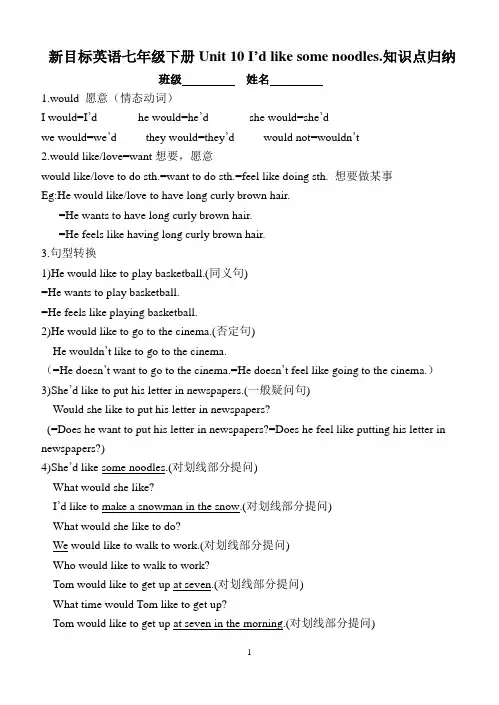
新目标英语七年级下册Unit 10 I’d like some noodles.知识点归纳班级姓名1.would 愿意(情态动词)I would=I’d he would=he’d she would=she’dwe would=we’d they would=they’d would not=wouldn’t2.would like/love=want想要,愿意would like/love to do sth.=want to do sth.=feel like doing sth. 想要做某事Eg:He would like/love to have long curly brown hair.=He wants to have long curly brown hair.=He feels like having long curly brown hair.3.句型转换1)He would like to play basketball.(同义句)=He wants to play basketball.=He feels like playing basketball.2)He would like to go to the cinema.(否定句)He wouldn’t like to go to the cinema.(=He doesn’t want to go to the cinema.=He doesn’t feel like going to the cinema.)3)She’d like to put his letter in newspapers.(一般疑问句)Would she like to put his letter in newspapers?(=Does he want to put his letter in newspapers?=Does he feel like putting his letter in newspapers?)4)She’d like some noodles.(对划线部分提问)What would she like?I’d like to make a snowman in the snow.(对划线部分提问)What would she like to do?We would like to walk to work.(对划线部分提问)Who would like to walk to work?Tom would like to get up at seven.(对划线部分提问)What time would Tom like to get up?Tom would like to get up at seven in the morning.(对划线部分提问)When would Tom like to get up?He’d like to play basketball at school.(对划线部分提问)Where would he like to play basketball?I’d like to see the giraffes. Because they are smart.(对划线部分提问)Why would you like to see the giraffes?I would like to go to school on foot.(对划线部分提问)How would you like to go to school?They’d like two potatoes.(对划线部分提问)How many potatoes would they like?They’d like a little milk.(对划线部分提问)How much milk would they like?I’d like a medium bowl of noodles.(对划线部分提问)What size bowl of noodles would you like?I’d like some beef and tomato noodles. (对划线部分提问)What kind of noodles would you like?5)I’d like some beef and potato noodles.(同义句)=I’d like some noodles with beef and potatoes.How old are you?(同义句)=What’s your age?6)Can you tell me? What does he want?(合并句子)Can you tell me what he wants?4.Would you like some noodles? 你想要一点面条吗?Yes,please. 是的。
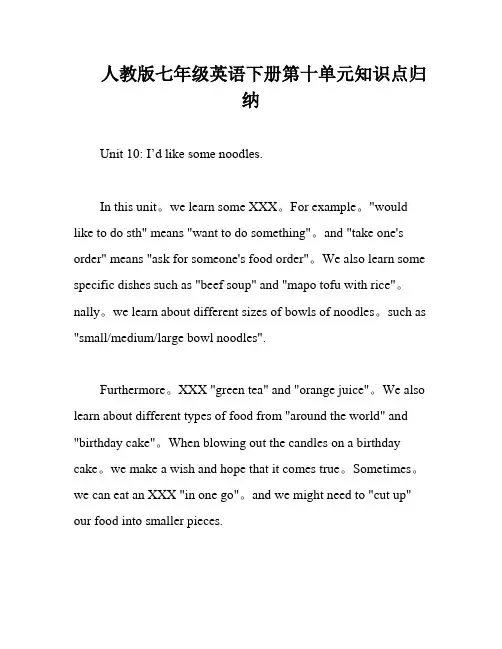
人教版七年级英语下册第十单元知识点归纳Unit 10: I’d like some noodles.In this unit。
we learn some XXX。
For example。
"would like to do sth" means "want to do something"。
and "take one's order" means "ask for someone's food order"。
We also learn some specific dishes such as "beef soup" and "mapo tofu with rice"。
nally。
we learn about different sizes of bowls of noodles。
such as "small/medium/large bowl noodles".Furthermore。
XXX "green tea" and "orange juice"。
We also learn about different types of food from "around the world" and "birthday cake"。
When blowing out the candles on a birthday cake。
we make a wish and hope that it comes true。
Sometimes。
we can eat an XXX "in one go"。
and we might need to "cut up" our food into smaller pieces.In n。
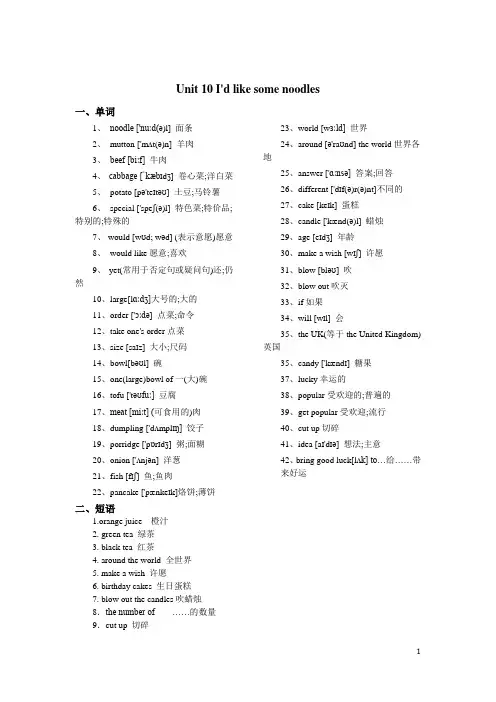
Unit 10 I'd like some noodles 一、单词1、noodle ['nuːd(ə)l] 面条2、mutton ['mʌt(ə)n] 羊肉3、beef [biːf] 牛肉4、cabbage [ˈkæbɪdʒ] 卷心菜;洋白菜5、potato [pə'teɪtəʊ] 土豆;马铃薯6、special ['speʃ(ə)l] 特色菜;特价品;特别的;特殊的7、would [wʊd; wəd] (表示意愿)愿意8、would like愿意;喜欢9、yet(常用于否定句或疑问句)还;仍然10、large[lɑːdʒ]大号的;大的11、order ['ɔːdə] 点菜;命令12、take one's order点菜13、size [saɪz] 大小;尺码14、bowl[bəʊl] 碗15、one(large)bowl of一(大)碗16、tofu ['təʊfuː] 豆腐17、meat [miːt] (可食用的)肉18、dumpling ['dʌmplɪŋ] 饺子19、porridge ['pɒrɪdʒ] 粥;面糊20、onion ['ʌnjən] 洋葱21、fish [fɪʃ] 鱼;鱼肉22、pancake ['pænkeɪk]烙饼;薄饼23、world [wɜːld] 世界24、around [ə'raʊnd] the world世界各地25、answer ['ɑːnsə] 答案;回答26、different ['dɪf(ə)r(ə)nt]不同的27、cake [keɪk] 蛋糕28、candle ['kænd(ə)l] 蜡烛29、age [eɪdʒ] 年龄30、make a wish [wɪʃ] 许愿31、blow [bləʊ] 吹32、blow out吹灭33、if如果34、will [wɪl] 会35、the UK(等于the United Kingdom)英国35、candy ['kændɪ] 糖果37、lucky幸运的38、popular受欢迎的;普遍的39、get popular受欢迎;流行40、cut up切碎41、idea [aɪ'dɪə] 想法;主意42、bring good luck[lʌk] to…给……带来好运二、短语1.orange juice 橙汁2. green tea 绿茶3. black tea 红茶4. around the world 全世界5. make a wish 许愿6. birthday cakes 生日蛋糕7. blow out the candles吹蜡烛8.the number of ……的数量9.cut up 切碎10.get popular 受欢迎11.the same(different) 相同(不同)12.bring good luck to 给……带来好运13. Pancake House 煎饼屋14. different kinds of 不同种类15. Don't worry!别担心!16.put on your glasses 戴上你的眼镜17.be short of 短缺三、语法1.would like意为“想要,愿意”,相当于want,用于提出要求或建议,但语气比want委婉,一般有以下三种形式:①would like sth.想要某物如:I would like some ice cream.我想要些冰淇淋。
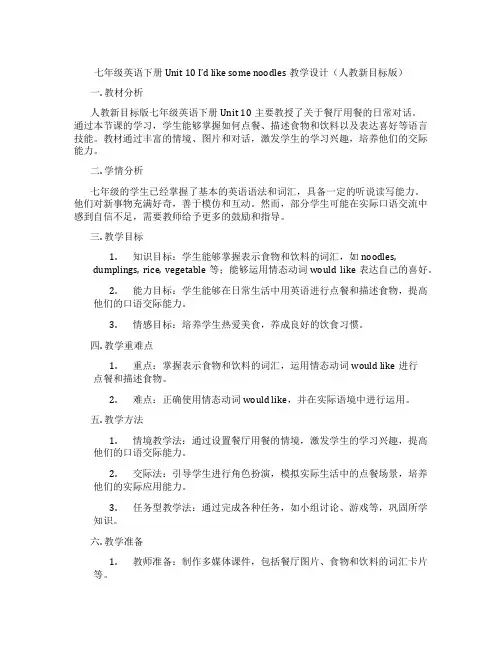
七年级英语下册Unit 10 I’d like some noodles教学设计(人教新目标版)一. 教材分析人教新目标版七年级英语下册Unit 10主要教授了关于餐厅用餐的日常对话。
通过本节课的学习,学生能够掌握如何点餐、描述食物和饮料以及表达喜好等语言技能。
教材通过丰富的情境、图片和对话,激发学生的学习兴趣,培养他们的交际能力。
二. 学情分析七年级的学生已经掌握了基本的英语语法和词汇,具备一定的听说读写能力。
他们对新事物充满好奇,善于模仿和互动。
然而,部分学生可能在实际口语交流中感到自信不足,需要教师给予更多的鼓励和指导。
三. 教学目标1.知识目标:学生能够掌握表示食物和饮料的词汇,如noodles,dumplings, rice, vegetable等;能够运用情态动词would like表达自己的喜好。
2.能力目标:学生能够在日常生活中用英语进行点餐和描述食物,提高他们的口语交际能力。
3.情感目标:培养学生热爱美食,养成良好的饮食习惯。
四. 教学重难点1.重点:掌握表示食物和饮料的词汇,运用情态动词would like进行点餐和描述食物。
2.难点:正确使用情态动词would like,并在实际语境中进行运用。
五. 教学方法1.情境教学法:通过设置餐厅用餐的情境,激发学生的学习兴趣,提高他们的口语交际能力。
2.交际法:引导学生进行角色扮演,模拟实际生活中的点餐场景,培养他们的实际应用能力。
3.任务型教学法:通过完成各种任务,如小组讨论、游戏等,巩固所学知识。
六. 教学准备1.教师准备:制作多媒体课件,包括餐厅图片、食物和饮料的词汇卡片等。
2.学生准备:预习本节课的生词和句子,了解餐厅用餐的基本礼仪。
七. 教学过程1.导入(5分钟)教师通过展示餐厅的图片,引导学生谈论他们喜欢的食物和饮料。
同时,教师询问学生:“Would you like something to eat or drink?”,让学生回答:“Yes, please./No, thank you.”,从而引出本节课的主题。
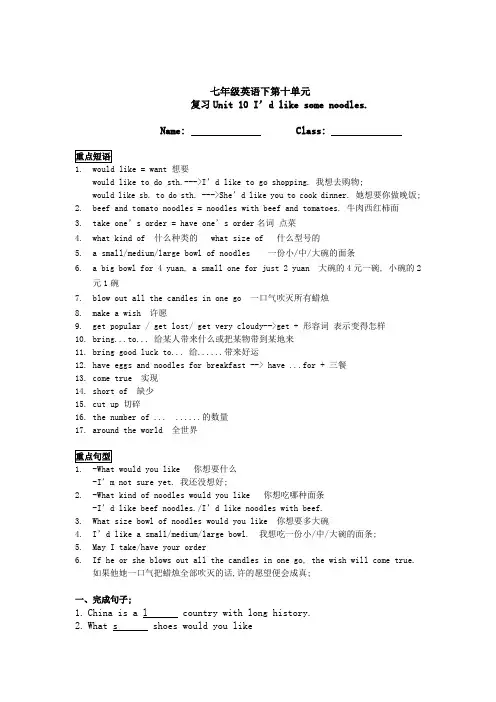
七年级英语下第十单元复习Unit 10 I’d like some noodles.Name: Class:1.would like = want 想要would like to do sth.--->I’d like to go shopping. 我想去购物;would like sb. to do sth. --->She’d like you to cook dinner. 她想要你做晚饭;2.beef and tomato noodles = noodles with beef and tomatoes. 牛肉西红柿面3.take one’s order = have one’s order名词点菜4.what kind of 什么种类的 what size of 什么型号的5. a small/medium/large bowl of noodles 一份小/中/大碗的面条6. a big bowl for 4 yuan, a small one for just 2 yuan 大碗的4元一碗, 小碗的2元1碗7.blow out all the candles in one go 一口气吹灭所有蜡烛8.make a wish 许愿9.get popular / get lost/ get very cloudy-->get + 形容词表示变得怎样10.bring...to... 给某人带来什么或把某物带到某地来11.bring good luck to... 给......带来好运12.have eggs and noodles for breakfast --> have ...for + 三餐e true 实现14.short of 缺少15.cut up 切碎16.the number of ... ......的数量17.around the world 全世界1.-What would you like 你想要什么-I’m not sure yet. 我还没想好;2.-What kind of noodles would you like 你想吃哪种面条-I’d like beef noodles./I’d like noodles with beef.3.What size bowl of noodles would you like 你想要多大碗4.I’d like a small/medium/large bowl. 我想吃一份小/中/大碗的面条;5.May I take/have your order6.If he or she blows out all the candles in one go, the wish will come true.如果他她一口气把蜡烛全部吹灭的话,许的愿望便会成真;一、完成句子;1.China is a l country with long history.2.What s shoes would you like3.-What’s your a -It’s 558 Bridge Street.4.They usually ________订购 food and drink in this restaurant.5.We have many great _______ 特色菜 in the restaurant.6.There ______be some beef and eggs in the noodles.7.I would like you come to my house.8.Look, they buy fruit and vegetables in the market.9.Let them ______help us with English.10.I as well as Jack _____do homework in the classroom now.11.They enjoy _________have beef.12. There are some ________tomato and _______ porridge on the table.13. What about ________ swim in the pool14. How about something ________eat二、翻译下列短语1. 实现2. 点菜3. 吹灭4. 想要5. 一口气6. 许愿7. 变得流行 8. 给......带来好运9. 缺少 10. 切碎三、翻译句子1. 你想吃什么2. 他还没想好;.3. 牛肉面里有蔬菜吗4. 蜡烛的数量就是人们的年龄;.5. 过生日的人必须对着蜡烛许愿,并吹灭蜡烛;.四、单项选择1. -What____ of dumplings do you want-Carrot and beef dumplings, please.A. sizeB. kindC. bowlD. \2. We like coffee_____ milk and sugar in it.A. hasB. withC. ofD. for3. -Would you like some bread -________.A. No, I wouldn’tB. That’s all rightC. Yes, pleaseD. Yes,I would4. My brother would like______ a friend of ______.A. to see, himB. seeing, himC. to see, hisD. seeing, his5. Welcome to our restaurant. We have_____.A. special somethingB. something specialC. anything specialD. specialanything6. Would you like______A. some juiceB. any juiceC. some juicesD. any juices7. -What would Mary like -She’d like_____.A. teaB. a teaC. a cup teaD. teas8.He has a nice house ______ an expensive car.A. tooB. alsoC. eitherD. as well as9.― Would you mind my smoking ― ____.A. Not at allB. I have no ideaC. Yes , pleaseD. I don’t know10. Andrew usually has fruit ______ dinner.A. ofB. forC. atD. with五、完型Do you want to stay healthy Let me tell you 1 have a healthy diet.In the morning, you can eat some bread, cakes and eggs. You should drink a glass of milk. It’s very important for you because it can 2 you much energy能量.It 3 good for you to go to school or work without breakfast.You must feel very 4 at lunchtime. So you have something good 5 lunch . You can have some fish or chicken. 6 , such as carrots and tomatoes, are also very important because they can keep you healthy.In the evening, you must be tired. You should eat things 7 noodles or others with some vegetables. But remember 8 eat too much because you can’t do much exercise in the evening. Before going to bed, you can have a glass of milk. It can 9 you sleep well.At last, you should eat more 10 . Here’s a proverb谚语:An apple a day keeps the doctor away.1. A. how B. how to C. what D. what to2. A. get B. spend C. give D. take3. A. does B. doesn’t C. is D. isn’t4. A. happy B. sad C. hungry D. busy5. A. to B. for C. of D. with6. A. Vegetables B. Meat C. Fruit D. Snacks7. A. are like B. like C. look like D. likes8. A. don’t B. to C. not to D. 不填9. A. turn B. start C. improve D. help10. A. apples B. oranges C. bananas D. pears六、阅读AMany people like to read the Guinness Book of World Records吉尼斯世界纪录大全, and some people want to be in it How do people get their names in the book They do something new and different,such as making the world’s largest cake with more than 54,000 eggs.For many people, it is fun to make world records 记录. It’s exciting. But who eats the cakeWhile some people are making world records, others don’t have much food to eat. Hunger is a very serious problem in many places. How many old people do not have enough money to buy good food How many children go to bed without dinner The answer is “too many”.1. How do people get their names in the Guinness Book of World RecordsA. They do something new and interesting.B. They do something new and different.C. They only have a large cake.D. They only make a large cake. 2. How many eggs are there in the world’s largest cakeA. 54,000B. More than 54,000C. Less than 54,000D. We don’t know.3. What’s Chinese meaning of the word “problem ”A. 粮食B. 人C. 问题D. 纪录4. Are there any children go to bed without dinner in the worldA. Yes, there aren’tB. Yes.C. No.D. Yes, there’re 54,000 5.What should we do when some poor people don’t have any foodA. We do nothing.B. We can make world records.C. We can give them some food.D. We are poor, too.BHere is a menu for a fast food restaurant. The prices are in American money, called dollars and cents. There are 100 cents in a dollar.6. From the menu, how much is a small hamburgerA. One hundred and eighty dollarsB. Two dollars and thirty centsC. Eighty centsD. One dollar and eighty cents7. If you have only three dollars, what can you buyA. A large salad and a large ice cream.B. A large chicken burger and a small cup of tea.C. A small vegetable burger and a large chocolate.D. An apple pie and a large hamburger with cheese.8. Jam is a kind of _____.A. main mealsB. side dishesC. dessertsD. drinks9. What can’t we buy in the restaurantA. CoffeeB. FriesC. HamburgerD. Beef10. A thirsty boy may ask for _____.A. coca colaB. donutsC. friesD. a chicken burger。
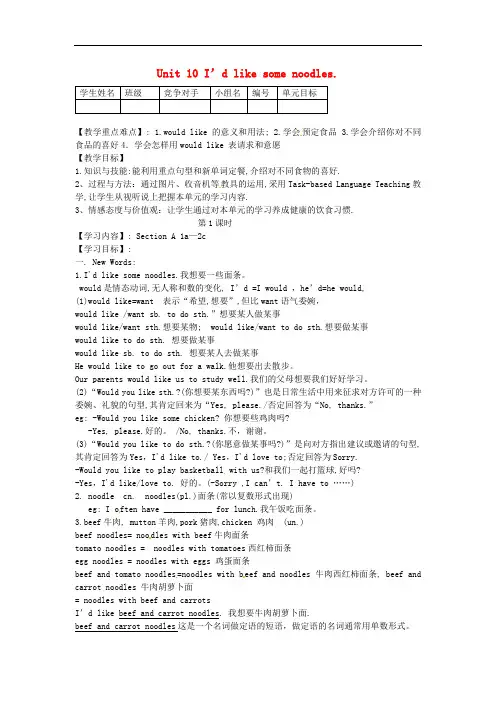
Unit 10 I’d like some noodles.【教学重点难点】: 1.would like 的意义和用法; 2.学会预定食品 3.学会介绍你对不同食品的喜好4.学会怎样用would like 表请求和意愿【教学目标】1.知识与技能:能利用重点句型和新单词定餐,介绍对不同食物的喜好.2、过程与方法:通过图片、收音机等教具的运用,采用Task-based Language Teaching教学,让学生从视听说上把握本单元的学习内容.3、情感态度与价值观:让学生通过对本单元的学习养成健康的饮食习惯.第1课时【学习内容】: Section A 1a—2c【学习目标】:一. New Words:1.I'd like some noodles.我想要一些面条。
would是情态动词,无人称和数的变化, I’d =I would ,he’d=he would,(1)would like=want 表示“希望,想要”,但比want语气委婉,would like /want sb. to do sth.”想要某人做某事would like/want sth.想要某物; would like/want to do sth.想要做某事would like to do sth. 想要做某事would like sb. to do sth. 想要某人去做某事He would like to go out for a walk.他想要出去散步。
Our parents would like us to study well.我们的父母想要我们好好学习。
(2)“Would you like sth.?(你想要某东西吗?)”也是日常生活中用来征求对方许可的一种委婉、礼貌的句型,其肯定回来为“Yes, please./否定回答为“No, thanks.”eg: -Would you like some chicken? 你想要些鸡肉吗?-Yes, please.好的。
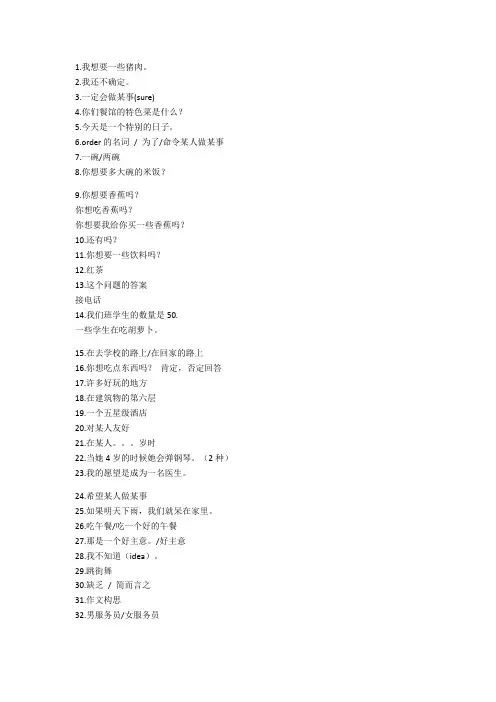
1.我想要一些猪肉。
2.我还不确定。
3.一定会做某事(sure)4.你们餐馆的特色菜是什么?5.今天是一个特别的日子。
6.order的名词/ 为了/命令某人做某事7.一碗/两碗8.你想要多大碗的米饭?9.你想要香蕉吗?你想吃香蕉吗?你想要我给你买一些香蕉吗?10.还有吗?11.你想要一些饮料吗?12.红茶13.这个问题的答案接电话14.我们班学生的数量是50.一些学生在吃胡萝卜。
15.在去学校的路上/在回家的路上16.你想吃点东西吗?肯定,否定回答17.许多好玩的地方18.在建筑物的第六层19.一个五星级酒店20.对某人友好21.在某人。
岁时22.当她4岁的时候她会弹钢琴。
(2种)23.我的愿望是成为一名医生。
24.希望某人做某事25.如果明天下雨,我们就呆在家里。
26.吃午餐/吃一个好的午餐27.那是一个好主意。
/好主意28.我不知道(idea)。
29.跳街舞30.缺乏/ 简而言之31.作文构思32.男服务员/女服务员33.你想要什么?34.我还不确定。
35.牛肉面里有一些蔬菜吗?36.我想要鸡蛋,西红柿和土豆面。
37.我想要牛肉和胡萝卜面条。
38.可以点菜了吗?39.我们想要一碗牛肉汤。
40.你想要多大碗的?41.一份麻婆豆腐带米饭42.你想要什么种类的面条?43.你想要一大碗吗?44.西红柿鸡蛋汤里有肉吗?45.不可数名词/ 既可数又不可数名词46.你想要一大碗面条吗?47.我想要带有胡萝卜的牛肉面。
48.我喜欢饺子,鱼和橙汁。
49.我不喜欢洋葱,绿茶和稀饭。
50.人们过生日的时候喜欢吃什么?51.吃带蜡烛的生日蛋糕52.蜡烛的数量便是过生日人的年龄。
53.许愿54.一次性吹灭所有的蜡烛55.愿望将会实现。
56.在生日蛋糕里放一块糖57.生日吃蛋糕渐渐流行。
58.切断面条59.长寿和好运的象征60.但是寓意是相同的。
61.在我们的餐馆62.有一些不错的特色菜63.不同种类的64.一大碗四块钱65.订购我们美味的烙饼66.他们只要5美金。
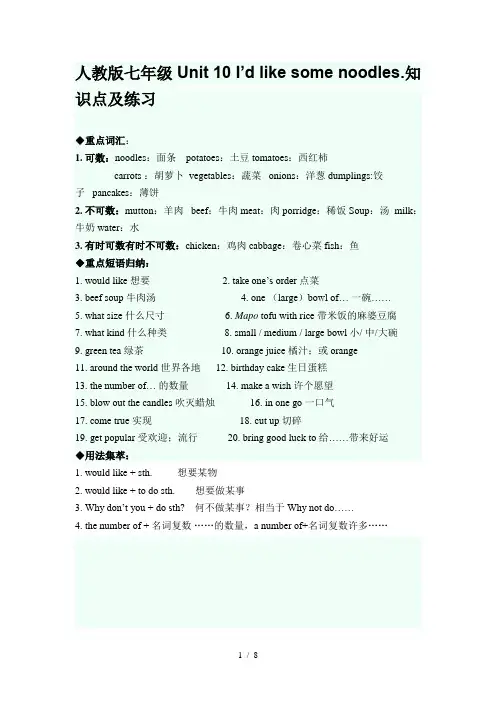
人教版七年级Unit 10 I’d like some noodles.知识点及练习◆重点词汇:1. 可数:noodles:面条 potatoes:土豆 tomatoes:西红柿carrots :胡萝卜 vegetables:蔬菜 onions:洋葱 dumplings:饺子 pancakes:薄饼2. 不可数:mutton:羊肉 beef:牛肉meat:肉porridge:稀饭Soup:汤 milk:牛奶 water:水3. 有时可数有时不可数:chicken:鸡肉cabbage:卷心菜fish:鱼◆重点短语归纳:1. would like 想要2. take one’s order点菜3. beef soup 牛肉汤4. one (large)bowl of…一碗……5. what size 什么尺寸6. Mapo tofu with rice带米饭的麻婆豆腐7. what kind 什么种类 8. small / medium / large bowl 小/ 中/大碗9. green tea 绿茶 10. orange juice 橘汁;或orange11. around the world 世界各地 12. birthday cake 生日蛋糕13. the number of…的数量 14. make a wish 许个愿望15. blow out the candles吹灭蜡烛 16. in one go 一口气17. come true 实现 18. cut up 切碎19. get popular 受欢迎;流行 20. bring good luck to 给……带来好运◆用法集萃:1. would like + sth. 想要某物2. would like + to do sth. 想要做某事3. Why don’t you + do sth?何不做某事?相当于Why not do……4. the number of + 名词复数……的数量,a number of+名词复数许多……1. would like的用法would like 意为想要,愿意,相当于want,用于提出要求或建议;但语气比want委婉,一般有一下三种形式:①would like sth. 想要某物,如:我想要些冰淇淋。
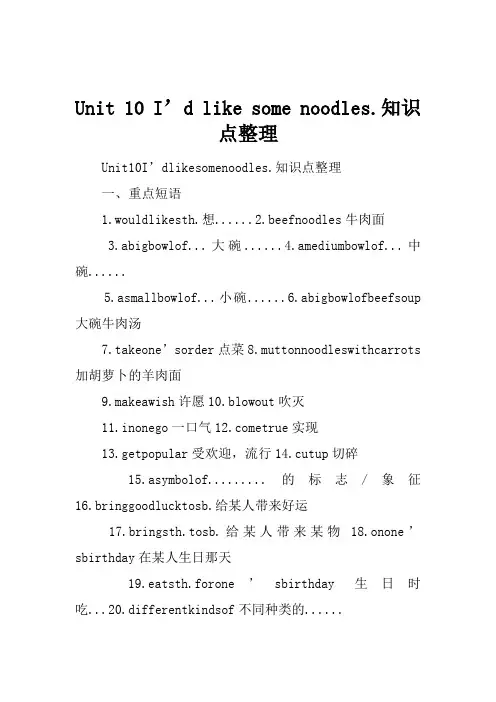
Unit 10 I’d like some noodles.知识点整理Unit10I’dlikesomenoodles.知识点整理一、重点短语1.wouldlikesth.想......2.beefnoodles牛肉面3.abigbowlof...大碗......4.amediumbowlof...中碗......5.asmallbowlof...小碗......6.abigbowlofbeefsoup 大碗牛肉汤7.takeone’sorder点菜8.muttonnoodleswithcarrots 加胡萝卜的羊肉面9.makeawish许愿10.blowout吹灭11.inonego一口气etrue实现13.getpopular受欢迎,流行14.cutup切碎15.asymbolof.........的标志/象征16.bringgoodlucktosb.给某人带来好运17.bringsth.tosb.给某人带来某物18.onone’sbirthday在某人生日那天19.eatsth.forone’sbirthday生日时吃...20.differentkindsof不同种类的......21.peopleinUk英国的人二、重点句型1.—whatkindofnoodleswouldyoulike?您想吃什么面?—I’dlikebeefnoodles,please.牛肉面。
2.—whatsizewouldyoulike?您要多大份的?—Large,please.大份的。
3.—Arethereanyvegetableinthemuttonnoodles?羊肉面里有蔬菜吗?—yes,therearesometomatoes.有,有一些西红柿。
4.—whatwouldyouliketoeat?您想吃什么?—I’dlikebeefnoodleswithcarrots.我想要加胡萝卜的牛肉面。
5.whatwouldpeopleliketoeatontheirbirthday?人们过生日吃什么?6.Thenumberofthecandlesisthepeople’sage.蜡烛的数量是人的年龄。
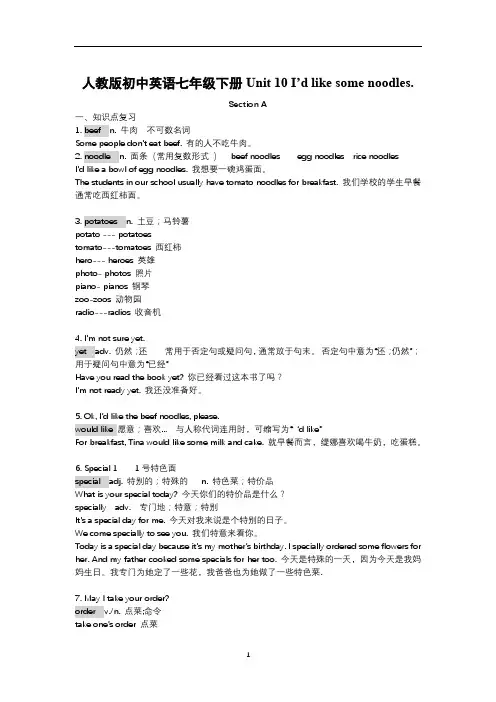
人教版初中英语七年级下册Unit 10 I’d like some noodles.Section A一、知识点复习1.beef n. 牛肉不可数名词Some people don’t eat beef. 有的人不吃牛肉。
2.noodle n. 面条(常用复数形式)beef noodles egg noodles rice noodlesI’d like a bowl of egg noodles. 我想要一碗鸡蛋面。
The students in our school usually have tomato noodles for breakfast. 我们学校的学生早餐通常吃西红柿面。
3.potatoes n. 土豆;马铃薯potato --- potatoestomato---tomatoes 西红柿hero--- heroes 英雄photo- photos 照片piano- pianos 钢琴zoo-zoos 动物园radio---radios 收音机4.I’m not sure yet.yet adv. 仍然;还常用于否定句或疑问句,通常放于句末。
否定句中意为“还;仍然”;用于疑问句中意为“已经”Have you read the book yet? 你已经看过这本书了吗?I’m not ready yet. 我还没准备好。
5.Ok, I’d like the beef noodles, please.would like 愿意;喜欢... 与人称代词连用时,可缩写为“‘d like”For breakfast, Tina would like some milk and cake. 就早餐而言,缇娜喜欢喝牛奶,吃蛋糕。
6.Special 1 1号特色面special adj. 特别的;特殊的n. 特色菜;特价品What is your special today? 今天你们的特价品是什么?specially adv. 专门地;特意;特别It’s a special day for me. 今天对我来说是个特别的日子。
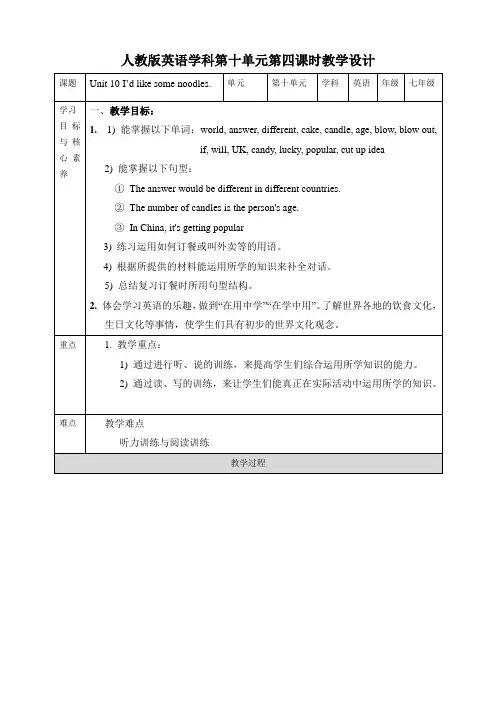
Unit 10 I’d like some noodles.Section A 1 (1a-2d)一、教学目标:1. 语言知识目标:1) 能掌握以下单词:noodles, mutton, beef, cabbage, potato, special, would, would like, order, bowl, size, tofu 能掌握以下句型:①— What would you like?②— I'm not sure yet. Are there any vegetables in the beef noodles?③ May I take your order?④— Can we have two bowls of beef soup then?— Sure. What size would you like?— Medium, please.2) 能了解以下语法:情态动词would的用法;3)能掌握订餐或叫外卖等的用语。
2. 情感态度价值观目标:体会学习英语的乐趣,做到“在用中学”“在学中用”。
养成一个良好的饮食习惯。
二、教学重难点1. 教学重点:1) 学习掌握本课时的重点词组及表达方式。
2) 引导学生们做听、说的训练。
2. 教学难点:通过role-play的方式掌握如何订餐等用语。
三、教学过程Ⅰ. Warming-up and lead in1. Watch a video program about food and vegetables.2. Ask and answer: What's your favorite food/drink/vegetables?Ⅱ. Presentation1. (show some pictures of food on the big screen)Present some new words and expressions to the Ss.2. Ss learn the new words and expressions by themselves and try to remember them.3. Work on 1a:Read the words on the left and look at the pictures on the right. Write the letters of the food on the line. Then check the answers.Ⅲ. Game (Guess the food.)(Show some pictures of food on the big screen)Let Ss guess what food it is.Ss try to guess the food and learn the words.Ⅳ. ListeningT: In the following conversation, one man is ordering some food. Now, let’s listen to the tape, find out the right noodles the person orders.Play the recording for the Ss to listen and check the answers.Ⅴ. Pair work1. Present the conversation in 1b on the big screen and ask Ss to practice it.2. Make their own conversations using the noodles in the picture.3. Let some pairs act out their conversations.Ⅵ. Listening1. Work on 2a;T: Now, look at the pictures on the right, listen to the conversations and check the names of the foods you hear.(Play the recording for the first time, students only listen carefully.Then, listen to the recording again, and check the names of the foods.Check the answers. )2. Work on 2b:(Play the recording for the Ss to listen and complete the sentences.)Play the recording twice. The first time Ss just listen. And the second time, Ss listen and write down the words.(If necessary, use the pause button to help Ss)3. Check the answers.Ⅶ. Pair work1. Ask and answer questions with your partner. Use the information in 2a.2. Show the conversations of 2a on the big screen to the Ss.3. Make a model for the Ss.T: What kind of noodles would you like?S1: I'd like beef noodles, please.…3. Ss work in pairs and practice the conversations.Ⅷ. Role-play1. Ask Ss to read the conversation in 2d and find the answer to this question:What would they like?(They would like one large bowl of beef soup, one gongbao chicken, and one mapo tofu with rice.)2. Check the answers with the Ss.3. Ss work with their partners and role-play the conversation.VIII. Language pointsIX. ExercisesHomework1. Review the words and expressions in this period.2. Role-play the conversation in 2d.3. Write a short conversation to order some noodles you like in a restaurant.板书设计:Section A 2 (Grammar Focus-3c)一、教学目标:1. 语言知识目标:1) 继续练习运用如何订餐或叫外卖等的用语。
可编辑修改精选全文完整版Unit10《I’d like some noodles》教学设计一、教材分析本堂课是针对七年级下册Unit 10I’d like some noodles而展开的,本课的阅读部分重点介绍了世界各地的生日饮食习惯,学生不仅要学会说语言,更要了解语言背后的文化知识,同时需要结合本课所学句型进行对话练习;此外,初中英语教学的最高境界是渗透多元文化视域,让学生以中国文化作为精神依附,有针对性地借鉴外国优秀文化成果,从而使英语教学在动态、连续的发展过程中顺应时代需求,针对本课饮食文化教学内容来说,学生需要善于捕捉时事热点,在后疫情时代,各国促生了新的礼节方式,英语课堂要引导学生了解疫情下各国的风俗礼仪,增加学生的文化积累,让学生在具体交际时能使用正确的用语和礼节,这也降低了跨文化交际错误的产生。
二、教学目标各国文化在世界范围内各自发展,文化多元化不是各国文化的相互同化或逐渐趋同,而是随着世界政治经济的高速发展,各国文化在相互吸收的基础上形成的一种相互交叉的生活方式。
本课也将从多元文化视域的角度出发,制定“多样化”的课堂设计,旨在激发学生的学习兴趣,补充生活体验,让学生的思维得到发散。
具体课堂目标设计如下:1. 知识领域:学生能够运用和掌握以下词汇:around the world、different、lucky、popular、candle、age等,掌握与饮食有关的表达、生日食品的含义;2.技能领域:运用思维导图简要复述文章大意,进行口头语段及语篇表达,并将其运用于个人讲述、集体讨论及课外采访中来。
3.情感领域:通过相关材料的学习与训练,深入体会中西方饮食文化的差异,体验生日文化气息,最终能在真实的跨文化交际中进行比较深入、得体的交流。
三、教学重难点1.教学重点:熟练掌握本课的重点单词和短语make a wish, blow out等,并了解中西方生日、饮食文化的差异;2.教学难点:学生需要掌握本课的重要语法点:the number of 与 anumber of的差别,if引导的条件状语从句,区别可数名词与不可数名词;四、教学准备基于创新教育的大背景下,教师需要在现代教育技术基础上重新审视各专业的特点,教学方式和策略也需要对照标准进一步更新,目前现代教育技术与英语教学跨领域融合的模式也给教学发展带来了新的机遇和挑战,本课教学中就采用了混合式教学模式,促进线上线下教学的相互融通,使现代教育技术与英语教学相融合。
Unit 10 I’d like some noodles.一、看谁记得又快又准。
(2 分钟)1. noodle 面条2. mutton 羊肉3. beef 牛肉4. cabbage 卷心菜;洋白菜5. potato 土豆;马铃薯6. special 特色菜;特价品; 特别的;特殊的7. would (表示意愿)愿意8. yet 还;仍然9. order 点菜10. bowl 碗11. size 大小;尺码12. tofu 豆腐13. large 大号的;大的14. would like 愿意;喜欢1. meat 肉2. a large bowl of 一大碗3. beef noodles 牛肉面4. potato salad土豆沙拉1. dumpling 饺子2. porridge 粥;面糊3. onion 洋葱4. fish 鱼;鱼肉5. pancake 烙饼;薄饼6. orange juice 桔汁1. world 世界2. answer 回答3. different 不同的4. cake 蛋糕5. candle 蜡烛6. age 年龄7. blow 吹8. if 如果9. will 将要;会10. UK 英国11. candy 糖果12. lucky 幸运的13. popular 受欢迎的;普遍的14. idea 想法;主意15. blow out 吹灭16. cut up 切碎二、根据首字母或汉语提示完成句子。
1. What kind of meat do you like better, mutton or beef?2. I’d like a large bowl of (一大碗)noodles.3. —What kind of noodles would you like?—Beef noodles(牛肉面). 4. Would you like potato salad (土豆沙拉)or fruit salad?5.Chinese people usually eat dumplings on the Spring Festival’s Eve.6.I eat a m bowl of rice for lunch every day.7.Waiter!Please give me a glass of orange j .8.—What s would you like? —A large bowl, please.9.Li Yuchun is a very p singer. A lot of boys and girls like her.10.Yao Ming is very tall. I think he should wear a l shirt.三、单项选择( )1.Would you like chicken breakfa st?A. one;toB. some;ofC. some;forD. a;for( )2.We have four salad in our shop.A. sizeB. kinds ofC. kind ofD. kinds( )3.—rice would you like? —Large, please.A. What kind ofB. What size bowl ofC. What size ofD. What( )4.We have b ought two for the coming party.A. box of appleB. boxes of applesC. box of applesD. boxes of apple( )5.There is little in the fridge. Let’s go and buy some.A. applesB. eggsC. vegetablesD. milk( )6.What would you like the pizza?A. inB. onC. atD. during( )7.The number of the boys in our class 35.A. areB. beC. amD. is( )8.I don’t like soda, hot dogs onions.A. andB. orC. butD. so( )9.He’d like a hamburger chicken.A. inB. onC. forD. with( )10.—Would you like a small hamburger?—.A. No, I would likeB. No, I wouldn’tC. No, thanksD. No, I don’t( )11. ________? –Yes, I’d like some tea.A. Where are youB. Can I help youC. Who are youD. What do you do( )12. Would you like something _________?A. eatB. to eatC. ateD. eating( )13. Would you like some more dumplings? -_______ I’m full.A. Yes, pleaseB. I’d love toC. No, I wouldn’tD. No, thanks( )14. Would you like to go shopping with me? ________.A. No, I wouldn’tB. Yes, I wouldC. Yes, I’d loveD. Yes, I’d love to( )15. Welcome to the _____ restaurant! We have different _____.A. noodle, noodlesB. noodles, noodleC. noodle, noodleD. noodles, noodles( )16. –Would you like ____ football with us?–Certainly. I like ____football very much.KFCTel: 62550011 Address: 28 Bridge Street Open: 9:00 a.m.~11:00 p.m.Food: fried chicken, French fries,hamburgers, porridge Drink : coke, coffee, milk, juiceDessert: ice cream Soup: vegetable soupBig Pizza (比萨饼)Tel: 88819056 Address: 102 Ting Street Open: 9:30a.m.~12:00 p.m.Food: beef pizza, mutton pizza,fruit pizza, vegetable pizza Drink: coffee, milk, fruit, juice Dessert: ice cream Soup: Italy (意大利) soupsA. play, to playB. playing, to playC. to play, playingD. playing, playing( )17. He says the ice cream tastes ______ and sells _______.A. good, goodB. well, well,C. well, goodD. good, well ( )18. I’d like some dumplings _______ cabbages and muttons..A. with B. in C. has D. have ( )19. How _____ green tea ______ there in the glass?A. much; isB. many; isC. much; areD. many; are ( )20. Look! Two ____ are playing basketball on the playgroundA. man teachB. man teachersC. men teacherD. men teachers 四、用括号里所给单词的适当形式填空 1.Can I (have )a look at your pictures?2.My father want s (order )a large bowl of noodles now.3.They had some great (special )on the menu this evening.4.Would you like (have )a cup of coffee?5.What kind of food her friend (like )? 五、句型转换1.She doesn’t like apples or oranges.(改为肯定句) She apples oranges.2.What kind of balls does Sonia want?(改为同义句) What kind of balls Sonia ?3.I like onion and egg dumplings.(改为同义句) I like dumplings and eggs.4.They have some bananas.(用pears 改为选择疑问句) they any bananas pears?5.They’d like a large hamburger.(就画线部分提问) they like?6.Mary would like to drink something. (改为同义句) Mary wants something to drink.六、阅读理解。
Unit 10I'd like some noodles.Section A【重点单词】1.noodle n.面条2.beef n.牛肉3.potato n.土豆;马铃薯4.special n.特色菜;特价品adj.特别的;特殊的5.would modal v.(表示意愿)愿意6.yet ad v.(常用于否定句或疑问句)还;仍然rge adj.大号的;大的8.order n.& v.点菜;命令9.size n.大小;尺码10.bowl n.碗11.meat n.(可食用的)肉【单词变形】rge—big(同义词)2.bowl—bowls(复数)3.potato—potatoes(复数)4.noodle—noodles(复数)【重点短语】1.mutton noodles羊肉面2.chicken noodles鸡肉面3.a bowl of…一碗……4.one (large) bowl of…一(大)碗……5.a medium bowl of…一中碗……6.a small bowl of…一小碗……7.good afternoon下午好8.take one's order点菜9.beef/mutton soup牛肉/羊肉汤10.what size多大(尺寸)11.tomato and egg soup番茄鸡蛋汤12.beef noodles with carrots有胡萝卜的牛肉面【重点句型】1.——您需要什么?——我还不确定。
牛肉面里有蔬菜吗?——有,里面有西红柿。
——好的,我就吃牛肉面了。
—What would you like?—I'm not sure yet.Are there any vegetables in the beef noodles? —Yes,there are some tomatoes.—OK,I'd like the beef noodles,please.2.——您想吃什么面?——就要牛肉面吧。
I’d like some noodles
Section A 第2课时(2a〜3c)
自主学习方案
1.自学生词,并记住拼读及拼写。
2.预习课本找出重点短语及句子。
(见学案自学导练内容)
3.读记后完成自学导练内容。
课堂导学方案
Step1 情景导入
Teacher:Do you like noodles?What kind of noodles do you like?
Student l:Yes,I like noodles very much. And I like beef noodles with vegetables.
Teacher:What about you?
Student 2:I like tomato noodles.
环节说明:通过师生互动复习上节课的内容,并且为新课的学习打下了基础。
Step 2完成教材2a-2c的任务
1.学生先观察图片,再和相对应图片匹配,最后完成la的听力任务。
(5分钟)
2.听录音,完成2b填空,核对答案后大声朗读句子。
(3分钟)
3.听第三遍录音,跟读并整体感知对话内容。
(2分钟)
4.两人一组,根据2b中的信息来练习对话,并邀请几组表演。
(3分钟)
参考案例:
A:What kind of noodles would you like?
B:I,d like beef noodles.
Step3完成教材2d的任务
1.学生自读对话,根据对话内容完成下列句子(5分钟)
(1)Sally would like some vegetables in the beef soup.
(2)Sally would like one large bowl of beef soup, one gongbao chicken,one mapo tofu with rice in all.
2.大声朗读2d对话,读熟后与同伴结对练习,分角色表演对话。
(3分钟)
3.创设情景:假设部分同学是服务员,另一部分是顾客,来练习对话。
(5分钟)
4.小结训练。
(3分钟)
A : What l of soup would you like?
B:I,d 2 egg and tomato soup.
A:Well,what 3 bowl of soup would you like?
B: What sizes do you have?
A:We have 4 ,medium and small bowls.
B: Oh,a medium 5 ,please.
l.kind 2. like 3.size
rge
5. one
环节说明:将对话转化成填空题,这样能对所学的重要句型起到复习巩固的作用。
Step 4 完成 Grammar Focus
参考学案p. 68单元语法透析归纳语法知识并完成配套练习。
Step 5完成教材3a—3c的任务
1.认真读3a的两组句子,然后将两组句子组成一个完整的对话,集体核对答案。
(3分钟)
2.两人一组练习对话,学生也可以根据自己的实际情况来练习,并请几组学生表演,完成3a。
(3分钟)
3.让学生利用所给的信息提示来写出问题和答语,并请学生将答案展示在黑板上。
要求学生识记句子,两人一组互相提问,完成3b。
(3分钟)
4.以小组为单位,每个学生用What would you like to eat?这个问题来采访其他的学生,其他学生用3c中所给的食物进行回答,然后把学生的名字填在相应的食物上面的卡片上,最后利用采访的结果完成一篇小短文。
(5分钟)
参考案例:
In our group, X X would l ike hamburg¬ers. XXX and Kate would like tomato andegg rice. XXX and X X would like beef and carrot noodles.
环节说明:通过本环节的学习,学生对前一阶段所学的知识进行复习巩固,同时也锻炼了学生的口语和写作能力。
课堂资料包
Step 1重难点解析
1.May I take your order?请问您点菜吗?
本句为餐馆里服务员常用语。
order此处用作可数名词,意为“点菜,订购”。
例如:
I want to give the bookshop an order for this book.我想向书店订购这本书。
order也可用作动词,意为“点菜,预订”。
例如: Would you like to order some bread?你想不想来些面包?
The man ordered a table for six in the restaurant .这位先生在饭店里订了一张六人位的桌子。
2.Is there any meat n the tomato and egg soup?西红柿鸡蛋汤里面有肉吗?
(1)meat是不可数名词,意为“肉,肉食”。
例如:Some animals, like tigers and lions, eat meat.有些动物,如老虎、狮子是食肉的。
There' not much meat on that bone.那块骨头上没多少肉。
(2)短语 tomato and egg soup 中 tomato and egg 作名词soup的定语。
名词作定语,修饰名词时,修饰词一般为单数形式。
例如:
She’d like beef and carrot n oodles.她想要牛肉胡萝卜面。
There are many banana trees by the river.河边有许多香蕉树。
【拓展】当man,woman作修饰语,修饰名词复数时,它们本身也要变为复数。
例如:that woman teacher—those women teachers
3.I’d like beef noodles with carrots.我想要胡萝卜牛肉面。
介词短语with carrots作后置定语修饰名词beef noodles。
beef noodles with carrots 相当于 beef and carrot noodles。
其中with用作介词,意为“有,具有”。
例如:China is a great country with a long history. 中国是一个历史悠久的伟大国家。
— What size would you like?你要多大碗的?
—Large,please.请来大碗的。
what size是用来询问物体大小、尺寸的常用句型。
size是名词,意为“大小;尺码”,既可表示物体的大小,又可用来表示服饰、鞋帽等的尺码、号码。
例如:
—What size shoes does your father wear?你爸爸穿多大号的鞋?
—He wears size 8.他穿8号的。
What size is your apartment?你的公寓多大?
【拓展】medium意为“中号的”,表示物体的型号,可缩写为M。
另外,small意为“小号的”,可缩写为 S;large意为“大号的”,可缩写为L。
Step 2小结训练
1.一Well, my sons take great interest in most of the food on the menu.
—Thanks. D ?
一Yes, fried fish, beef, chips and cola, please .
A.Can I do for you B . At your service
C . What to follow
D . Shall I take your order
2.All the D in our school enjoyed them¬selves on March 8th because it was their own holiday
A.man teachers
B.men teachers
C.woman teachers
D.women teachers
3.Project Hope has built many schools D big classrooms and libraries.
A in
B of
C.for D with
4.一What B noodles would you like?
一Small,please.
A kind
B size
C kinds
D sizes
Step3 家庭作业
完成课后提升作业(学案p.65)
教学反思
本课时以师生对话的方式自然引人新课,同时通过听、说、读、写相结合的方式巩固重点知识,强化教学内容。